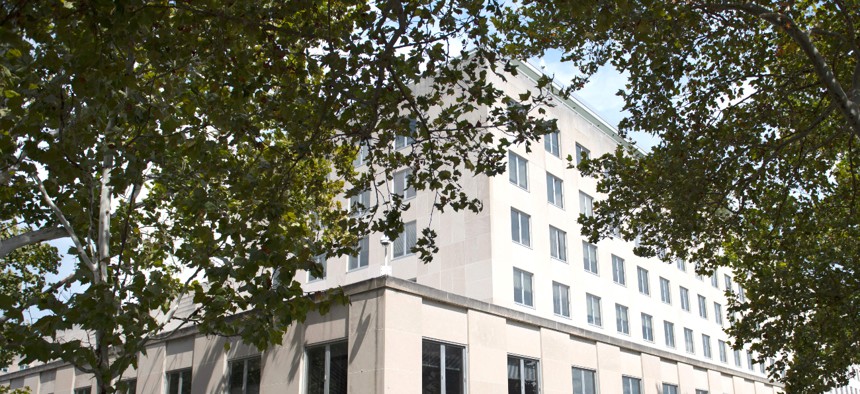
The five-year strategic plan includes making advancement of DEIA a part of the criteria for job performance, career advancement and senior performance pay, among other things. DANIEL SLIM/AFP via Getty Images
State Department Releases its Roadmap for Increasing Diversity and Equity
The department also announced last month a new, paid fellowship and internship program aimed at bringing individuals with diverse backgrounds to the department.
The nation’s top diplomat doubled down Tuesday on his commitment to increase diversity, equity, inclusion, and accessibility in his workforce as his department released a roadmap of how they’re going to achieve that.
The State Department has had varied progress on diversity over the years, as the Government Accountability Office said in an early 2020 report. Then more recently, GAO reported the department has taken actions to improve DEIA in the workforce, although “gaps remain in measurement and accountability.”
“During my confirmation hearing, I said that I would judge the success of my tenure, in part, by how well I lead the department to be more diverse, equitable, inclusive, and accessible,” said Secretary of State Antony Blinken in a statement on Tuesday, as his department shared its five-year DEIA strategic plan, pursuant to President Biden’s June 2021 executive order on increasing DEIA in the federal workforce. “Together, we will make the department a more effective organization, better equipped to meet the challenges and opportunities of the 21st century.”
Amb. Gina Abercrombie-Winstanley, State’s chief diversity and inclusion officer, along with her team, has “worked diligently with department stakeholders and experts to finalize the [plan] and “establish the department’s first-ever demographic baseline report,” said the secretary. While testifying before a Senate committee in July, Abercrombie-Winstanley shared numerous initiatives, some of which were already underway, and said this time the department’s efforts on DEIA would be different.
Specifically, the five-year strategic plan includes: using data and an evidence-based approach to determine barriers member of the workforce face to equitable career outcomes; making advancement of DEIA a part of the criteria for job performance, career advancement and senior performance pay; targeting underrepresented groups in recruitment efforts; conducting a first-of-its-kind DEIA climate survey across the department; enhancing the reasonable accommodations for individuals with disabilities and making the culture more disability-inclusive; being more transparent about legal obligations for religious accommodations; and creating a retention unit to look at the root causes of attrition.
Additionally, “as a fundamental part of the retention effort, the retention unit is developing a Workforce Flexibilities Plan under the Future of Work process, which will focus on updates to technology and improved transparent, objective, and fair telework policies,” said a factsheet.
Last month the department announced a new “Colin Powell Leadership Program” to help further the department’s efforts to bring people with diverse backgrounds to State via paid fellowships and internships, both of which could lead to full-time employment.
“Colin Powell understood that diversity ‘is a source of strength, it is a source of our success,’ and exemplified his leadership values — both as a general and as Secretary of State — by putting people first,” an announcement from the department stated.
Also, the department announced in April it was overhauling the hiring process for foreign service officers, which included making the almost 100-year-old writing and language skills test play less of a role. Abercrombie-Winstanley said in July “this levels the playing field and allows the department to examine more candidates from a wider variety of backgrounds.”







